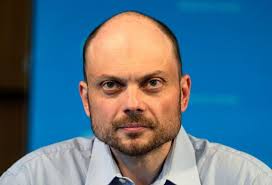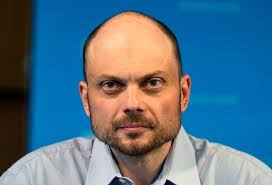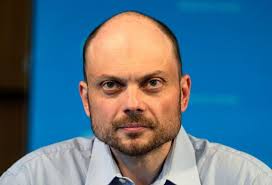Putin critic
Putin critic

Table of Contents
In August 2024, the high-profile release of Vladimir Kara-Murza, a prominent critic of Russian President Vladimir Putin, marked a significant and historic moment in international diplomacy. Kara-Murza, who had been imprisoned in Russia on charges widely seen as politically motivated, was released as part of a complex and unprecedented prisoner swap. The circumstances surrounding his release, including his belief that he was facing execution, reveal the intense personal and political stakes involved in the case.

The Release: A Historic Prisoner Swap
Background of the Prisoner Swap:
- Negotiated Deal: The release of Vladimir Kara-Murza came as part of a larger, high-stakes prisoner swap involving multiple countries and individuals. The deal, which was reportedly months in the making, included the exchange of several high-profile prisoners from different nations.
- Involvement of Mediators: The negotiation process involved multiple mediators and diplomatic channels. Key players included representatives from international organizations, state actors, and diplomatic intermediaries who worked to facilitate the complex arrangement.
Details of Kara-Murza’s Release:
- Condition of Release: Kara-Murza was released from a Russian prison after spending several years behind bars. His release was met with widespread relief and jubilation from his supporters and human rights advocates.
- Timing and Circumstances: The release was timed to coincide with diplomatic events and negotiations, underscoring the strategic nature of the swap and its implications for international relations.
Kara-Murza’s Belief About Execution
Fears and Concerns:
- Execution Threats: Before his release, Kara-Murza reportedly feared that he was being prepared for execution. These fears were fueled by the harsh conditions of his imprisonment, the nature of the charges against him, and the broader context of repression faced by political dissidents in Russia.
- Psychological Impact: Kara-Murza’s fear of execution highlights the intense psychological and emotional toll of prolonged imprisonment and the uncertainty faced by political prisoners. His belief that he was facing execution reflects the extreme pressures and dangers associated with dissent in authoritarian regimes.
Conditions of Imprisonment:
- Harsh Conditions: During his time in prison, Kara-Murza experienced harsh conditions, including isolation, limited access to legal representation, and inadequate medical care. These conditions contributed to his sense of vulnerability and heightened fears for his safety.
- Legal and Human Rights Issues: The charges against Kara-Murza were widely criticized by international human rights organizations as politically motivated and lacking in due process. The treatment of Kara-Murza in prison was seen as part of a broader pattern of repression against political dissidents in Russia.
Vladimir Kara-Murza: A Profile
Political Activism:
- Critique of Putin: Vladimir Kara-Murza is known for his outspoken criticism of President Vladimir Putin and his government. He has been a vocal advocate for democratic reforms, human rights, and international accountability.
- Previous Activism: Kara-Murza’s activism has included efforts to expose corruption, promote political transparency, and support civil society initiatives. His work has made him a target of government repression and intimidation.
Arrest and Imprisonment:
- Charges and Conviction: Kara-Murza was arrested on charges related to his political activities, including accusations of spreading false information and undermining national security. His trial and conviction were widely criticized as politically motivated and lacking in fairness.
- Health and Well-being: During his imprisonment, Kara-Murza’s health deteriorated due to the harsh conditions and lack of adequate medical care. His deteriorating health further fueled concerns about his safety and well-being.Putin critic
The Diplomatic and Political Implications
International Reactions:
- Support for Kara-Murza: The release of Kara-Murza was met with widespread support from international leaders, human rights organizations, and advocacy groups. His case had drawn significant attention and condemnation from the international community.
- Diplomatic Significance: The prisoner swap and Kara-Murza’s release have significant diplomatic implications, affecting relations between the involved countries and highlighting the role of diplomacy in resolving complex international issues.Putin critic
Impact on Russian Politics:
- Repression and Dissent: The case of Kara-Murza underscores the broader issues of political repression and dissent in Russia. His release, while a positive development, does not address the underlying issues of political freedom and human rights in the country.
- Government Response: The Russian government’s response to the prisoner swap and Kara-Murza’s release will be closely monitored. The handling of the case reflects broader patterns of government repression and the management of political dissent.Putin critic
Human Rights and Legal Considerations
Human Rights Advocacy:
- Global Support: The case of Vladimir Kara-Murza has highlighted the importance of international human rights advocacy and the need to address political repression. Advocacy groups and international organizations have played a key role in drawing attention to Kara-Murza’s plight and supporting his release.
- Legal Precedents: The case may set legal and diplomatic precedents for addressing political repression and negotiating prisoner swaps. The handling of Kara-Murza’s case underscores the need for continued efforts to uphold human rights and address abuses.Putin critic
Future Implications:
- Ongoing Advocacy: The release of Kara-Murza will likely lead to continued advocacy for political prisoners and human rights. The international community may use the case as a basis for further efforts to address political repression and support democratic reforms.
- Diplomatic Relations: The implications of the prisoner swap and Kara-Murza’s release will influence diplomatic relations and negotiations between the involved countries. The case highlights the role of diplomacy in resolving complex international issues and addressing human rights concerns.Putin critic
The Broader Context of Political Prisoners
Global Trends:
- Political Prisoners Worldwide: The case of Vladimir Kara-Murza reflects broader global trends regarding political prisoners and human rights abuses. Political repression and the treatment of dissidents remain critical issues in many countries.
- International Responses: The international community’s response to cases of political imprisonment and repression varies, but there is a growing emphasis on addressing human rights abuses and advocating for the release of political prisoners.Putin critic

Challenges and Opportunities:
- Addressing Repression: Addressing political repression and advocating for the release of political prisoners requires a multifaceted approach, including diplomatic pressure, international advocacy, and support for civil society initiatives.







